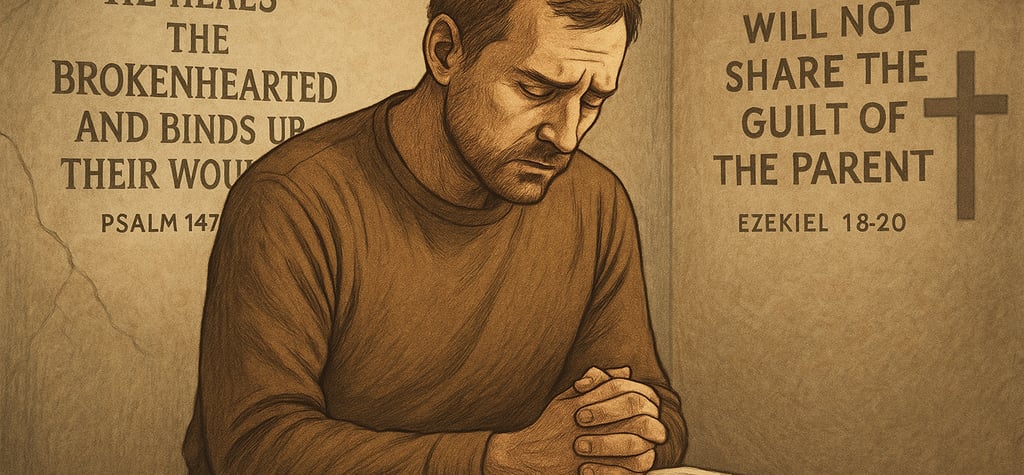Breaking the Cycle: Healing from Emotional Trauma and Finding Renewal
Many people carry wounds from childhood, shaped by parents who, though doing their best, may have been emotionally immature. This isn't about blame; it's about healing.
Alan Dyer
6/8/20254 min read


Breaking the Cycle: Healing from Emotional Trauma and Finding Renewal
The Weight of an Unspoken Past
Michael never thought much about his childhood. He had a roof over his head, food on the table, and parents who made sure he got good grades. From the outside, everything seemed fine. But as an adult, Michael found himself struggling in ways he couldn't explain.
In friendships and relationships, he felt distant even when people showed him love. Compliments made him uncomfortable, and he rarely asked for help, always insisting, “I can handle it.” Deep down, he carried an exhausting fear: if he messed up, if he showed weakness, people would abandon him.
One day, after an argument with his wife about something trivial, she asked, “Why do you always assume I’m going to leave when things get hard?”
The question struck him like lightning. Why did he feel that way? He replayed moments from childhood, the times he tried to share his feelings but was told, “Stop being so dramatic.” The moments when his parents dismissed his sadness with, “You’re fine.” He realized he had learned early on that emotions were unsafe, that he had to be strong, or he’d be left behind.
Michael had spent years unknowingly carrying the weight of emotional neglect. His parents weren’t cruel, they loved him, but they had never learned how to nurture emotions, because they hadn’t been nurtured themselves. And now, as an adult, he was carrying those patterns.
Then, Michael came across Ezekiel 18:20, which says, “The child will not share the guilt of the parent, nor will the parent share the guilt of the child.” It struck him deeply, he was not bound to the emotional struggles of his past. He didn’t have to repeat what his parents had experienced.
As he continued seeking healing, he read Psalm 147:3, “He heals the brokenhearted and binds up their wounds.” For the first time, he realized that God saw his wounds, and more importantly, God was capable of restoring him.
Michael learned that feeling is not weakness, that vulnerability is part of real connection. And more importantly, he chose to break the cycle, determined to raise his own children with emotional openness.
Like Joseph in Genesis 50:20, who told his brothers, “You meant evil against me, but God meant it for good,” Michael saw that even in his pain, God was working to bring healing—not just for him, but for generations to come.
Emotionally immature parents can have a significant impact on their children, often leading to long-term emotional and psychological challenges. These parents may struggle with emotional regulation, lack empathy, or prioritize their own needs over their child's well-being. Some common effects on children include:
Low self-esteem: Children may internalize negative messages and feel unworthy or inadequate.
Difficulty forming healthy relationships: Growing up with emotionally immature parents can lead to struggles with trust, boundaries, and emotional expression.
People-pleasing tendencies: Some children develop a habit of overcompensating to gain approval and validation.
Codependency: Blurred boundaries between parent and child can result in codependent behaviors later in life.
Emotionally immature parents may also resort to hurtful language, such as calling their children "loser" or "burden," which can have lasting psychological effects.
Some effects of stalled emotional development include:
Difficulty regulating emotions—struggles with anger, anxiety, or emotional numbness.
Challenges in relationships—difficulty trusting others or forming secure attachments.
Self-worth issues—internalizing negative beliefs about themselves.
Repeating unhealthy patterns—unconsciously recreating childhood dynamics in adulthood.
Breaking the Cycle: Healing from Emotional Trauma and Finding Renewal
Recognizing the Wound
Many people carry wounds from childhood, shaped by parents who, though doing their best, may have been emotionally immature. This isn't about blame; it's about healing. Often, these parents were raised in similar circumstances, creating a cycle that continues from generation to generation. Today, we’ll explore how God can heal these wounds, and how we can move forward in grace.
Understanding the Cycle
The Bible acknowledges generational struggles. In Exodus 20:5-6, we see that sins can affect multiple generations—but God also extends mercy to those who seek Him. In Ezekiel 18:20, we learn that each person is accountable for their actions, meaning that no one is trapped in the past—we can break free.
Consider Joseph, who endured mistreatment from his own brothers, yet chose forgiveness (Genesis 50:20). Jesus Himself knew rejection, even in His own hometown (Mark 6:4), yet He continued His mission of healing.
How Childhood Trauma Affects Emotional Growth
Science confirms what Scripture suggests trauma can stall emotional development. A child raised in emotional neglect may struggle with trust, self-worth, and regulating emotions. But healing is possible through awareness, renewal, and God’s grace.
The Power of Forgiveness and Understanding
It’s easy to resent those who hurt us. But Jesus, even as He was crucified, prayed, “Father, forgive them, for they do not know what they are doing” (Luke 23:34). Many parents, locked in cycles of emotional immaturity, did not know the harm they caused. Rather than carrying resentment, we can embrace compassion, not excusing wrongs, but choosing freedom from bitterness.
Practical Steps Toward Healing
Recognizing the wound – bringing it before God.
Seeking support – mentors, counseling, prayer.
Rebuilding emotional maturity – learning healthy expression.
Choosing a different path – breaking the cycle for future generations.
A Call to Renewal
Today, God invites us to release the past, embrace healing, and renew our hearts. Let’s pray for restoration both within ourselves and across generations.
References for further understanding:
Books on Healing from Childhood Emotional Trauma
Adult Children of Emotionally Immature Parents: How to Heal from Distant, Rejecting, or Self-Involved Parents, by Lindsay C. Gibson PsyD
The Body Keeps the Score, by Dr. Bessel van der Kolk
Explores how trauma affects the brain and body, offering insights into healing through therapy, mindfulness, and movement.
Complex PTSD: From Surviving to Thriving, by Pete Walker
Focuses on Complex PTSD, which often stems from prolonged childhood trauma, and provides practical steps for recovery.
Healing the Child Within, by Charles L. Whitfield
Discusses how childhood wounds shape adult behaviors and offers guidance on reconnecting with the "inner child" for healing.
What My Bones Know: A Memoir of Healing from Complex Trauma, by Stephanie Foo
A deeply personal account of overcoming childhood trauma, offering both emotional depth and practical insights.
The Boy Who Was Raised as a Dog, by Dr. Bruce Perry
Shares real-life cases of childhood trauma and how understanding brain development can lead to healing.
© SDBEST LLC, 2025. All rights reserved.
alan@wambology.org
